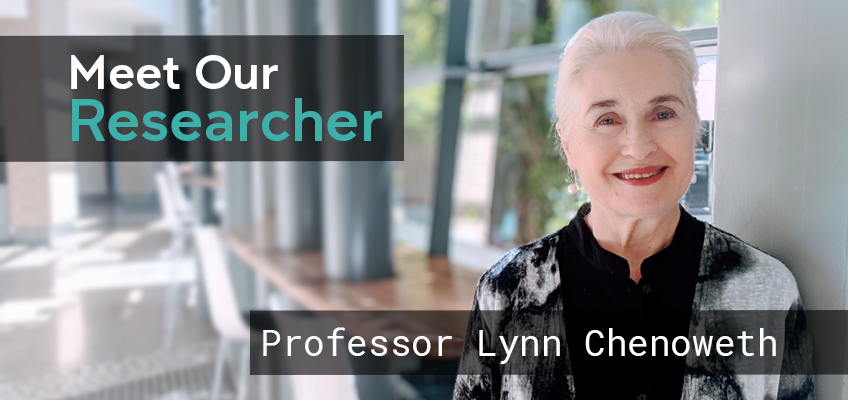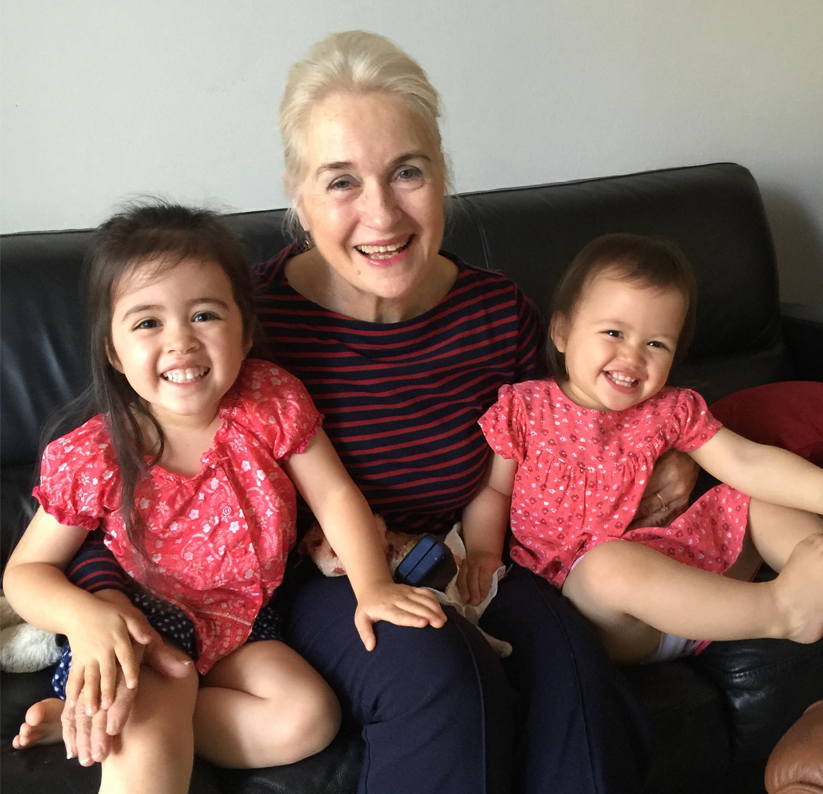14 Dec 2020

Professor of Nursing Lynn Chenoweth is a researcher, health clinician and educator and has been researching aged care, health and aged care policy and contributing to aged care nursing education and practice since 1987. An important outcome of Professor Chenoweth’s research is the potential to influence policy decisions on how best to enable and support the health, emotional and social needs of older people – including family carers and persons living with dementia. Her hope is that her research not only provides robust evidence of the benefits of implementing safe person-centred systems of treatment and care, but that the evidence is accepted and applied across local, state and national health jurisdictions.
How did you first get into researching?
In the third year of an undergraduate arts degree, I was invited by the Head of School to undertake a national study commissioned by the Department of Health and Ageing, which aimed to investigate lifestyle opportunities for people living in the residential aged care setting. I think it was my clinical and managerial nursing background that was considered suitable for leading this commissioned study. The 18-month study essentially constituted an honours program which was undertaken in the third and fourth years of the degree. Working with another student and our academic supervisors, I developed a program of research which reached out to residential aged care managers, staff in a range of roles, aged care residents and their families. We conducted the study across four states and two territories, surveying 1000 managers and staff, 500 residents and 400 of their family members over 6 months. This was followed up by one-on-one interviews with many hundreds of staff, residents and family members over the next six months. I also undertook detailed observations of resident lifestyle opportunities in 30 care homes across NSW.
Having obtained such a vast amount of data over a relatively short space of time, that then needed to be analysed and synthesised, I realised that undertaking research was intellectually, emotionally and physically demanding, but also very rewarding.
Fortunately, the Department was very happy with the conduct of the study and the study findings. Our recommendations for improving lifestyle opportunities for older people living in residential aged care were taken into consideration when the Department started working on developing the preliminary Outcome Standards for the aged care sector in 1987. This initial foray into that research topic led me to pursue a Masters by research in the area of social policy and then to undertake a PhD in the field. As part of a Masters of Adult Education degree I also undertook a national study of how critical thinking skills were developed with Bachelor of Nursing students, which resulted in guidelines to support education in critical thinking in undergraduate degrees.
Did you experience a ‘defining moment’ which led you to this field?
The results of the undergraduate research study in the residential aged care sector highlighted some serious issues with residential aged care sector services, as well as identifying areas which worked for the benefit of the residents. It was clear that much could be done to improve life experiences, health and well-being for people living in this setting. As the results and recommendations arising from this study were taken into consideration by the Department when developing the preliminary Outcome Standards policy for the residential aged care sector, I realised that research evidence can be a powerful tool for policy and practice change. My PhD study explored and informed service standards in that sector more comprehensively and resulted, in part, in the development of the final Outcomes Standards policy for residential aged care in 1992. This initial research interest led to my later research in dementia care, health and aged care support and service models, as well as in innovations aimed at supporting health and well-being during transitions in older age. My research in health and aged care service redesign is informed by the primary healthcare paradigm, where I take the view that health and aged care services ought to be structured and delivered in ways that benefit the person and therefore, service providers must strive to work in collaboration with the person and their support networks in achieving the person’s self-determined goals.

Do you have any personal interests or activities which are protective behaviours against cognitive decline?
Like many others working pretty much most of the time, I value the opportunity to enjoy the company of my family and friends - walking, talking, laughing, exploring and eating together. In an earlier life I enjoyed dancing (ballet), playing piano and acting in local theatre, but taking on a research career prevented continuation of these pleasure activities. I suppose that some of the protective lifestyle behaviours I practice include eating whole foods, eating very little pre-cooked and processed food and doing my own cooking. I also avoid sun damage to my skin and eyes by wearing hats and sunglasses, as having managed the reconstructive surgical unit at RPAH for 9 years, I am aware of the invasive damage that can occur with skin cancers. Now that I am able to work part-time, I am getting back into enjoyable and healthy leisure activities such as gardening, going to the theatre and concerts, walking by the water, entertaining and spending time with family and friends. I also think caring for my grandchildren and being fully involved in my children’s lives is a good way of keeping my mind and body active and fit and being alive to the possibilities that life has to offer. I am an active member of a feminist book club, which has really extended my thinking about social issues from a feminist perspective. As well, I have had the opportunity to travel overseas throughout my adult life and this always presented the most amazing opportunities to immerse myself in other cultures and to learn more about life within different worldviews. I think it is important for me to maintain an active, open mind in helping me to focus, but also to reflect. During this past year, with more home-based work and thus less travel time, I have had more sleep than I have had since I was a teenager. I think being able to sleep for longer each day has really boosted my sense of well-being and given me greater energy for my work.
What are you currently researching?
I am currently working with researchers from several universities and service organisations in four continuing studies and we have just completed a pilot trial of person-centred care for people with dementia in the acute care setting. We hope to translate the strategies that were found to be effective in implementing person-centred care in the sub-acute setting in 2021, pending funding. Current studies include: Dementia Medicines-Consumer priorities/recommendations, funded by the AAIC. The structure and predictive value of intrinsic capacity in a longitudinal study of ageing in China, funded through the Health@Business research funding scheme; Exploring Adoption and Functional Outcomes of Technology in Persons 60 years and above, also funded by Health@Business research; Evaluating Maybo training to improve staff response to aggression in people living with dementia, sponsored by Montefiore; and Developing a Competency for Aged and Dementia Healthcare practice which is funded by the NSW Government Technology Vocation research foundation. Higher degree research studies of which I am the principal or co-supervisor include: SOCIAL: Meaningful relationships in care (Janet Mitchell, UNSW); Development and validation of the End of life Care Assessment Tool for people with Dementia (Carolyn Bourke, UNDA); Evaluating the translation and outcomes of an on-line person-centred care education program for sub-acute healthcare staff (Jacquelene Cook, UNDA); and Development and evaluation of an education program to improve recognition and management of delirium in hospital patients with dementia (Elizabeth Endean, UNDA).
Why is your research important?
Past and current research programs have included projects that connect scholarly research with communities of practice, based on the conviction that applied research should have utility and relevance to public policy and be of benefit to society. Consequently, I have endeavoured to undertake research that investigates and addresses issues that are salient to health consumers, and to inform the way that service providers, health practitioners and mangers offer healthcare and support services. An important outcome of this type of research is its potential to influence policy decisions on how best to enable and support the health, emotional and social needs of older people, family carers and persons living with dementia or other neurological conditions such as Parkinson’s disease. Knowledge translation has been a dynamic and iterative process of sharing, synthesising and applying evidence-based knowledge gained through research, to improve health systems and practices and subsequently, to improve the health and well-being of different consumer groups. A motif of this research program has been its relevance to people of culturally and linguistically diverse backgrounds.
What do you love about working for CHeBA?
The most enjoyable moments at CHeBA include the eclectic and lively discussions around researchable questions, research priorities and research methods. CHeBA students and staff are incredibly talented and interesting people and are also extremely friendly and open to different ideas. Having the opportunity to discuss ideas and have general conversations with students and staff from so many different countries and cultures is so uplifting. I always come home from work feeling appreciative of my regular exposure to the wealth of knowledge that exists among the CHeBA community.
CHeBA has also provided me with unlimited opportunities to pursue my research agenda, even though this differs in many respects to the major work of CHeBA, and to find support and expertise among its multi-talented students and staff.
The Co-Directors Henry Brodaty and Perminder Sachdev are truly inspiring and amazing researchers, and they have made my time at CHeBA extremely rewarding and enjoyable.
What is the ultimate hope you have for your research?
As I have previously expressed, I would hope that my research program not only provides robust evidence of the benefits of implementing safe person-centred systems of treatment and care for people debilitated by dementia, but that the evidence is accepted and applied across local, state and national health jurisdictions to improve health systems and processes for them. As well, given the progressive and deteriorating nature of dementia and the multi-layered requirements that people will have at different stages of living with dementia, the most important research outcomes are those which help the person to retain their identity, health and well-being, by supporting the person’s rights to self-determination, social inclusion, meaningful life activity, functional support and quality health services.
Donations are fundamental for critical research to continue following COVID-19.
If you would like to discuss supporting Professor Chenoweth's work specifically, or would like information
on leaving a legacy via a Gift in your Will, please contact h.douglass@unsw.edu.au.

Lynn Chenoweth (RN, BA, MA (Hons), MAdEd, PhD)
Lynn’s clinical nursing qualifications and her clinical and managerial experiences have been in neurology and neurosurgery, plastic and reconstructive surgery, and gerontology. She has academic qualifications in health and social sciences, health politics and health policy, and adult education. Her interdisciplinary research program focuses on: 1. issues impacting older people, those living with dementia and family carers, 2. health and well-being during older age transitions; safe and effective health and aged care systems for older people and people living with dementia and 3. person-centred approaches to care services.
